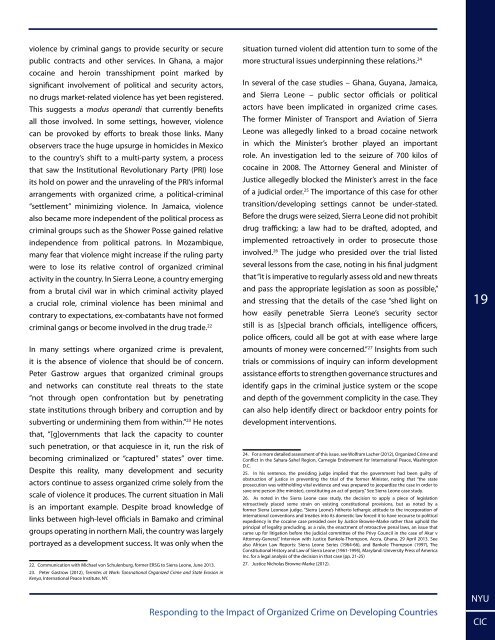here - Center on International Cooperation - New York University
here - Center on International Cooperation - New York University
here - Center on International Cooperation - New York University
Create successful ePaper yourself
Turn your PDF publications into a flip-book with our unique Google optimized e-Paper software.
violence by criminal gangs to provide security or securepublic c<strong>on</strong>tracts and other services. In Ghana, a majorcocaine and heroin transshipment point marked bysignificant involvement of political and security actors,no drugs market-related violence has yet been registered.This suggests a modus operandi that currently benefitsall those involved. In some settings, however, violencecan be provoked by efforts to break those links. Manyobservers trace the huge upsurge in homicides in Mexicoto the country’s shift to a multi-party system, a processthat saw the Instituti<strong>on</strong>al Revoluti<strong>on</strong>ary Party (PRI) loseits hold <strong>on</strong> power and the unraveling of the PRI’s informalarrangements with organized crime, a political-criminal“settlement” minimizing violence. In Jamaica, violencealso became more independent of the political process ascriminal groups such as the Shower Posse gained relativeindependence from political patr<strong>on</strong>s. In Mozambique,many fear that violence might increase if the ruling partywere to lose its relative c<strong>on</strong>trol of organized criminalactivity in the country. In Sierra Le<strong>on</strong>e, a country emergingfrom a brutal civil war in which criminal activity playeda crucial role, criminal violence has been minimal andc<strong>on</strong>trary to expectati<strong>on</strong>s, ex-combatants have not formedcriminal gangs or become involved in the drug trade. 22In many settings w<str<strong>on</strong>g>here</str<strong>on</strong>g> organized crime is prevalent,it is the absence of violence that should be of c<strong>on</strong>cern.Peter Gastrow argues that organized criminal groupsand networks can c<strong>on</strong>stitute real threats to the state“not through open c<strong>on</strong>fr<strong>on</strong>tati<strong>on</strong> but by penetratingstate instituti<strong>on</strong>s through bribery and corrupti<strong>on</strong> and bysubverting or undermining them from within.” 23 He notesthat, “[g]overnments that lack the capacity to countersuch penetrati<strong>on</strong>, or that acquiesce in it, run the risk ofbecoming criminalized or “captured” states” over time.Despite this reality, many development and securityactors c<strong>on</strong>tinue to assess organized crime solely from thescale of violence it produces. The current situati<strong>on</strong> in Maliis an important example. Despite broad knowledge oflinks between high-level officials in Bamako and criminalgroups operating in northern Mali, the country was largelyportrayed as a development success. It was <strong>on</strong>ly when the22. Communicati<strong>on</strong> with Michael v<strong>on</strong> Schulenburg, former ERSG to Sierra Le<strong>on</strong>e, June 2013.23. Peter Gastrow (2012), Termites at Work: Tansnati<strong>on</strong>al Organized Crime and State Erosi<strong>on</strong> inKenya, Internati<strong>on</strong>al Peace Institute, NY.situati<strong>on</strong> turned violent did attenti<strong>on</strong> turn to some of themore structural issues underpinning these relati<strong>on</strong>s. 24In several of the case studies – Ghana, Guyana, Jamaica,and Sierra Le<strong>on</strong>e – public sector officials or politicalactors have been implicated in organized crime cases.The former Minister of Transport and Aviati<strong>on</strong> of SierraLe<strong>on</strong>e was allegedly linked to a broad cocaine networkin which the Minister’s brother played an importantrole. An investigati<strong>on</strong> led to the seizure of 700 kilos ofcocaine in 2008. The Attorney General and Minister ofJustice allegedly blocked the Minister’s arrest in the faceof a judicial order. 25 The importance of this case for othertransiti<strong>on</strong>/developing settings cannot be under-stated.Before the drugs were seized, Sierra Le<strong>on</strong>e did not prohibitdrug trafficking; a law had to be drafted, adopted, andimplemented retroactively in order to prosecute thoseinvolved. 26 The judge who presided over the trial listedseveral less<strong>on</strong>s from the case, noting in his final judgmentthat “it is imperative to regularly assess old and new threatsand pass the appropriate legislati<strong>on</strong> as so<strong>on</strong> as possible,”and stressing that the details of the case “shed light <strong>on</strong>how easily penetrable Sierra Le<strong>on</strong>e’s security sectorstill is as [s]pecial branch officials, intelligence officers,police officers, could all be got at with ease w<str<strong>on</strong>g>here</str<strong>on</strong>g> largeamounts of m<strong>on</strong>ey were c<strong>on</strong>cerned.” 27 Insights from suchtrials or commissi<strong>on</strong>s of inquiry can inform developmentassistance efforts to strengthen governance structures andidentify gaps in the criminal justice system or the scopeand depth of the government complicity in the case. Theycan also help identify direct or backdoor entry points fordevelopment interventi<strong>on</strong>s.24. For a more detailed assessment of this issue. see Wolfram Lacher (2012), Organized Crime andC<strong>on</strong>flict in the Sahara-Sahel Regi<strong>on</strong>, Carnegie Endowment for Internati<strong>on</strong>al Peace, Washingt<strong>on</strong>D.C.25. In his sentence, the presiding judge implied that the government had been guilty ofobstructi<strong>on</strong> of justice in preventing the trial of the former Minister, noting that “the stateprosecuti<strong>on</strong> was withholding vital evidence and was prepared to jeopardize the case in order tosave <strong>on</strong>e pers<strong>on</strong> (the minister), c<strong>on</strong>stituting an act of perjury.” See Sierra Le<strong>on</strong>e case study.26. As noted in the Sierra Le<strong>on</strong>e case study, the decisi<strong>on</strong> to apply a piece of legislati<strong>on</strong>retroactively placed some strain <strong>on</strong> existing c<strong>on</strong>stituti<strong>on</strong>al provisi<strong>on</strong>s, but as noted by aformer Sierra Le<strong>on</strong>ean judge, “Sierra Le<strong>on</strong>e’s hitherto lethargic attitude to the incorporati<strong>on</strong> ofinternati<strong>on</strong>al c<strong>on</strong>venti<strong>on</strong>s and treaties into its domestic law forced it to have recourse to politicalexpediency in the cocaine case presided over by Justice Browne-Marke rather than uphold theprincipal of legality precluding, as a rule, the enactment of retroactive penal laws, an issue thatcame up for litigati<strong>on</strong> before the judicial committee of the Privy Council in the case of Akar vAttorney-General.” Interview with Justice Bankole-Thomps<strong>on</strong>, Accra, Ghana, 29 April 2013. Seealso African Law Reports: Sierra Le<strong>on</strong>e Series (1964-66), and Bankole Thomps<strong>on</strong> (1997), TheC<strong>on</strong>stituti<strong>on</strong>al History and Law of Sierra Le<strong>on</strong>e (1961-1995), Maryland: <strong>University</strong> Press of AmericaInc. for a legal analysis of the decisi<strong>on</strong> in that case (pp. 21-25)27. Justice Nicholas Browne-Marke (2012).19Resp<strong>on</strong>ding to the Impact of Organized Crime <strong>on</strong> Developing CountriesNYUCIC
















